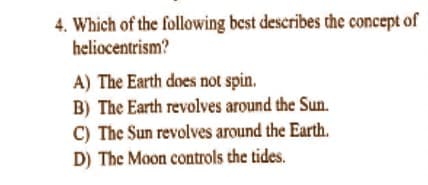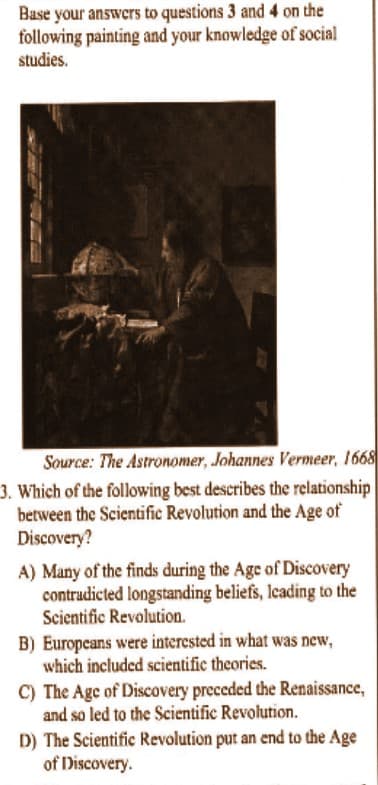Base your answers to questions 3 and 4 on the following painting and your knowledge of social studies. 4) Which of the following best describes the concept of heliocentrism? A) The Earth does not spin. B) The Earth revolves around the Sun. C) The Sun revolves around the Earth. D) The Moon controls the rides.
Base your answers to questions 3 and 4 on the following painting and your knowledge of social studies. 4) Which of the following best describes the concept of heliocentrism? A) The Earth does not spin. B) The Earth revolves around the Sun. C) The Sun revolves around the Earth. D) The Moon controls the rides.
Related questions
Question
Base your answers to questions 3 and 4 on the following painting and your knowledge of social studies.
4) Which of the following best describes the concept of heliocentrism?
A) The Earth does not spin.
B) The Earth revolves around the Sun.
C) The Sun revolves around the Earth.
D) The Moon controls the rides.

Transcribed Image Text:4. Which of the following best describes the concept of
heliocentrism?
A) The Earth does not spin.
B) The Earth revolves around the Sun.
C) The Sun revolves around the Earth.
D) The Moon controls the tides.

Transcribed Image Text:Base your answers to questions 3 and 4 on the
following painting and your knowledge of social
studies.
Source: The Astronomer, Johannes Vermeer, 1668
3. Which of the following best describes the relationship
between the Scientific Revolution and the Age of
Discovery?
A) Many of the finds during the Age of Discovery
contradicted longstanding beliefs, leading to the
Scientific Revolution.
B) Europeans were interested in what was new,
which included scientific theories.
C) The Age of Discovery preceded the Renaissance,
and so led to the Scientific Revolution.
D) The Scientific Revolution put an end to the Age
of Discovery.
Expert Solution
This question has been solved!
Explore an expertly crafted, step-by-step solution for a thorough understanding of key concepts.
This is a popular solution!
Trending now
This is a popular solution!
Step by step
Solved in 2 steps
